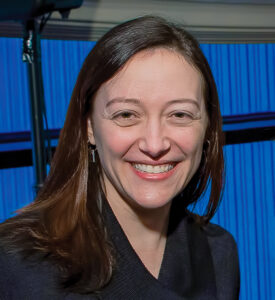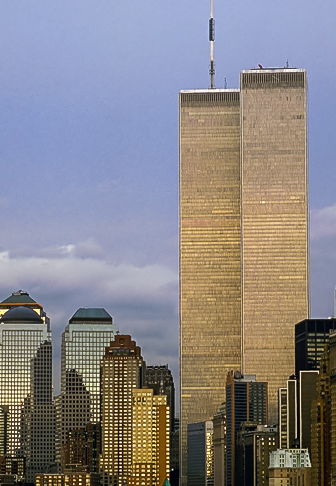How Will We Remember 2020?
For the past 10 months, we’ve been in the midst of what feel like several historic events. Decades from now, we’ll share discussions and teach future generations about life in 2020—what it was like to experience a pandemic, a worldwide rally for racial equality, and a tumultuous political election all at the same time. But, how will we really remember this unprecedented year in our lives?
 The research done by cognitive psychologist and psychology department head Jennifer Talarico shows that when it comes to turning points or historic moments, our memories work more like a jigsaw puzzle than a recording device. The result certainly resembles the picture on the box, but is also slightly different in important ways. Each time you build that puzzle, you construct that image, and it can change over time as pieces get worn, or torn, or lost.
The research done by cognitive psychologist and psychology department head Jennifer Talarico shows that when it comes to turning points or historic moments, our memories work more like a jigsaw puzzle than a recording device. The result certainly resembles the picture on the box, but is also slightly different in important ways. Each time you build that puzzle, you construct that image, and it can change over time as pieces get worn, or torn, or lost.
“Two people who experienced the same event may have a different recollection of what happened at that event,” explains Talarico. “And, subsequent experiences like talking about the event or looking at photographs can further change your memory of it.”
Let’s examine two factors—social connection and personal transition—that will shape how we remember, and misremember, the events of 2020.
Social Connection
What social groups do you identify with? What ethnic background does your family have? What activities is your identity attached to? Where do you live? The groups in which we define ourselves help us shape our perceptions of events—and consequently, also help shape our memories. For example, Black Americans have different memories of events that have unfolded throughout this year (or that have historically) than white Americans.
Today’s college students can expect to have vivid memories of their college years . . . because of the especially emotional and disruptive events going on in the world right now.
Talarico points to a classic study concerning flashbulb memory—a vivid recollection of exactly where we were and what we were doing when we learned about an important event—that asked participants about their memories surrounding the assassinations of U.S. President John F. Kennedy and American civil rights activists Martin Luther King Jr., Malcolm X, and Medgar Evers. While all participants of the study had a flashbulb memory for Kennedy’s killing, Black people were more likely to recall their personal circumstances of learning about the murders of King, Malcolm X, and Evers.
It is important to note that flashbulb memories recall the experience of learning about an event, not the factual details of the event itself.
“Not all historical events lead to flashbulb memories. An event must capture our individual attention and be identified as something significant before the memory is intensified. In order for us to exhibit this enhanced memory phenomenon, it seems critical that we feel a sense of personal or cultural connection to the event that results in a strong emotional reaction,” Talarico wrote in a feature in The Conversation, a global network of newsrooms committed to information transparency and credibility.
Emotion that is tied to a particular event also tends to make that event stand out and become more memorable, and likely to be longer lasting and accessible as we each recall our life stories. As events surrounding racial injustice and politics have spread across the country, we have seen video evidence emerge that also has been impactful in terms of driving emotion—and therefore making these events more memorable.
“If we think about the kinds of events that are going on, many of them are very emotional. Most of us are willing to acknowledge that these events are not new and that Black people in the United States have been the victims of police brutality for centuries. But, there is something different about capturing that on video,” says Talarico. “Vivid imagery makes something more memorable. Having that footage, whether it’s a still photo or video footage, makes it, according to basic principles to memory, more memorable than just a retold story.”
And while we as Americans may have all been part of or exposed to simultaneous tumultuous events this year, our memories of those events are more likely to be tied to geography and our social groups.
“To identify a shared experience, there needs to be a community that shares that experience,” Talarico says in a 2020 AP news story. “Is it happening to ‘us’? Is it happening to ‘my’ social group, ‘my’ people? If it’s happening to ‘my’ people, I will talk about it in a certain way.”
“A period like this, where there is tremendous upheaval at all of these levels—we’re seeing this internationally, and certainly nationally—many people are seeing it in their individual communities or in their families with parental job loss due to COVID-19, as well as other kinds of indirect effects,” says Talarico. “It’s hitting all of these different levels of your lived experience that’s going to make that stay with you.”
Personal Transition
Students who are in college right now, Talarico points out, “can expect to have long-lasting, vivid memories of their college years not only because most people remember that time of their life quite well, but also because of the especially emotional and disruptive events going on in the world right now.”
The phenomenon of the reminiscence bump is where, if you ask older adults to recall events from their life, they are more likely to recall events that happened during the ages of about about 15 to 25.
“Generally speaking, more recent events are remembered better, and then as you go back in time, you would imagine a sort of [declining] curve. But what we get is an unexpected bump around younger adulthood, which is the prime age where our students are,” Talarico explains. “There is something different about being 12 when something happens versus being 20, or if something happens when you’re 20, versus when you’re 30. Somehow those 10 years of going from 10 to 20 are just categorically different than going from 20 to 30. Those of us who are in middle adulthood, that’s a longer period of our lives. When we think about the arch of a life story, that period of middle age is a period of greater stability.”
The stability of middle age is contrasted with the disruptions of early adulthood. Transitions in our lives are events marked by significant change. Other key transition events in our lives include buying a first home, marriage, having a first child, or starting the first job that is in line with our career goals. It is no surprise that because of their significance, memories of these events are stronger and therefore are more likely to be recalled.
Talarico’s research on transitions and turning points published in the British Psychological Society’ Research Digest also show that transitions provide a backdrop against which related memories may be organized; by pinpointing very distinct happenings in one’s life, transitions also may supply “temporal landmarks” that help us sort our memories in terms of time as well as space.
Which circles us back to the question: Decades from now, how will we reconstruct the events of this year when we recall this tumultuous time?
Will 2020 Create Flashbulb Memories?
While 2020 certainly seems like a memorable year, Talarico says because it’s a string of connected events, rather than a single dramatic event, it will impact how we remember it. However, even our memories of those significant watershed moments are not always as accurate as we believe.
Take, for example: September 11, 2001. We would all like to believe that we remember exactly where we were, what we were doing, or what we said in reaction to the news that day. But our memories of what occurred and what actually occurred are likely to be different.
 “On Sept. 12, 2001, Talarico and her graduate school adviser David Rubin asked undergraduates about their memories of how they learned about the terrorist attacks, as well as an ordinary autobiographical memory from the preceding weekend. In the months afterward, they followed up with those undergrads to see if and how their memories changed.
“On Sept. 12, 2001, Talarico and her graduate school adviser David Rubin asked undergraduates about their memories of how they learned about the terrorist attacks, as well as an ordinary autobiographical memory from the preceding weekend. In the months afterward, they followed up with those undergrads to see if and how their memories changed.
“The attacks of 9/11 were highly emotional and dominated not just national discourse, but also much of private conversation for days and weeks later. These processes serve to enhance the vividness of our memories and our subjective confidence in those recollections,” Talarico wrote for U.S. News & World Report. “Furthermore, by virtue of having these long-lasting and detailed memories, we can demonstrate and reinforce our membership in these important social groups. Community exhortations to ‘never forget’ serve to maintain memories not just collectively, but individually.”
This also ties in to how social connection plays a role in how our memories are created.
“Some theorists have argued that part of the reason that our flashbulb memories are so long-lasting is because having such a vivid memory is ‘proof’ of our membership in a particular social group,” Talarico wrote for The Conversation. “It would be a poor patriot who could not remember what he or she was doing on September 11, 2001.”
Yet, when Rubin and Talarico examined the descriptions of their memories written a few days after September 11, 2001, with descriptions written by those same individuals a week, a month, a half-year, or even a year later, the reports were not necessarily consistent. People not only forgot details that they initially reported, but they also introduced new details in subsequent retellings. So, although most people believed they were remembering how they heard the news exactly as it had happened, the objective reports refuted that subjective phenomenon